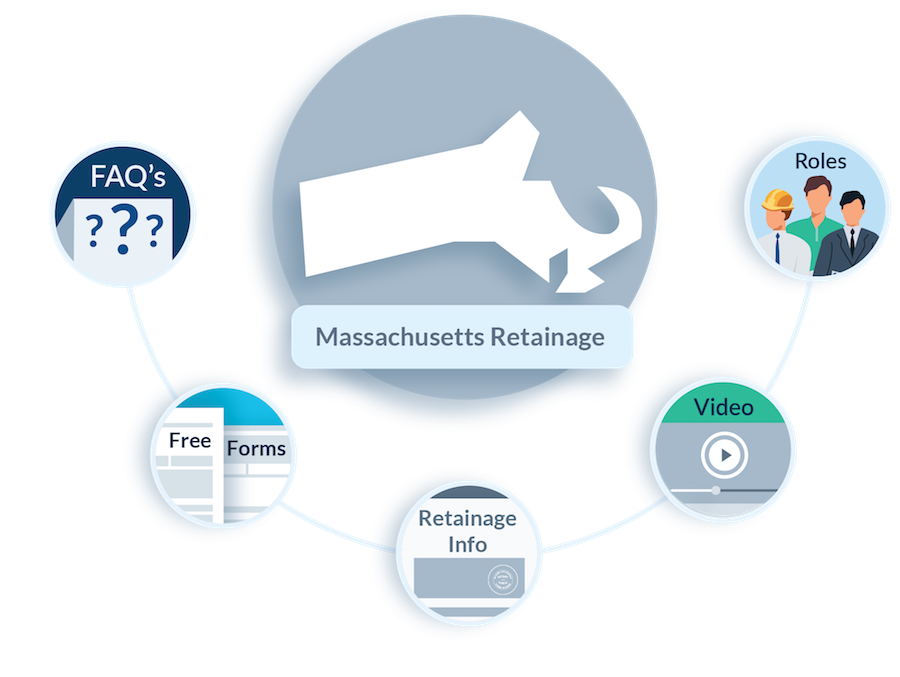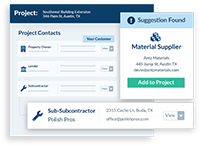(a) As used in this section, the following words shall, unless the context clearly requires otherwise, have the following meanings:—
”Claim”, an allegation that a person seeking payment of retainage breached the person’s contract for construction for the project; provided, however, that a ”claim” shall be subject to the applicable dispute resolution procedure, notice and other requirements in the contract for construction.
”Contract for construction”, a contract for which a lien may be established under sections 2 or 4 of chapter 254 on a project for which the person whose contract with the project owner has an original contract price of not less than $3,000,000; provided, however, that ”contract for construction” shall not include a project containing or designed to contain at least 1 but not more than 4 dwelling units.
”Deliverable”, a project close-out document that shall be submitted by the person seeking payment of retainage under the person’s contract for construction; provided, however, that a lien waiver or release, which is a deliverable, shall comply with chapter 254; and provided further, that ”deliverable” shall not include any document affirming, certifying or confirming completion or correction of labor, materials or other items furnished or incomplete or defective work.
”Incomplete or defective work”, labor, materials or any other item required for full performance by a person seeking payment of retainage which remains to be furnished by the person under the person’s contract for construction or which has been furnished by the person but requires correction, repair, further completion, revision or replacement; provided, however, that ”incomplete or defective work” shall not include deliverables or labor, materials or any other item to be repaired or replaced after substantial or final completion pursuant to a warranty, guarantee or other contractual obligation to correct defective work after substantial or final completion.
”Person”, any natural person, joint venture, partnership, corporation or other business or legal entity who enters into a contract for construction.
”Prime contractor”, a person who enters into a contract for construction with the project owner.
”Retainage”, a portion or percentage of a payment due pursuant to a contract for construction that is withheld to ensure full performance of the contract for construction.
”Substantial completion”, the stage in the progress of the project when the work required by the contract for construction with the project owner is sufficiently complete in accordance with the contract for construction so that the project owner may occupy or utilize the work for its intended use; provided further, that ”substantial completion” may apply to the entire project or a phase of the entire project if the contract for construction with the project owner expressly permits substantial completion to apply to defined phases of the project.
(b) No contract for construction shall include retainage that exceeds 5 per cent of any progress payment.
(c) Not later than 14 days after reaching substantial completion, the prime contractor shall submit to the project owner a notice of substantial completion, substantially in the form provided in this subsection, stating the date on which the project was substantially complete.
FORM FOR NOTICE OF SUBSTANTIAL COMPLETION
NOTICE OF SUBSTANTIAL COMPLETION
Under M.G.L. c. 149, § 29F
For [project name]
To [project owner]:
The undersigned hereby gives notice that the project was substantially complete, as defined under M.G.L. c. 149, § 29F, on [date of substantial completion]. This notice is certified as made in good faith on [date of notice].
By___
[prime contractor]
Accepted:
By___
[project owner]
Dated: ___
(d) The project owner shall accept or reject the notice of substantial completion within 14 days of receipt of the notice. The project owner shall indicate its acceptance by signing the notice in the space provided and shall deliver the notice to the prime contractor within the same 14–day period. If the project owner fails to deliver the notice to the prime contractor within the 14–day period, the notice shall be deemed accepted. If the project owner rejects the notice of substantial completion, the project owner shall, within 14 days of receipt of the notice described in subsection (c), notify the prime contractor in writing of the rejection and include in the rejection the factual and contractual basis for the rejection and a certification that the rejection is made in good faith. A rejection of the notice shall be subject to the dispute resolution provisions of the contract for construction, which, notwithstanding any provision in the contract to the contrary, shall be commenced by the prime contractor within 7 days of receipt of the rejection of the project owner. The prime contractor and project owner shall prosecute the dispute resolution procedures diligently, expeditiously and in good faith. A notice of substantial completion not rejected by the project owner within 14 days of receipt of the notice and in accordance with this subsection shall be deemed accepted by the project owner. Upon an express or deemed acceptance of a notice of substantial completion, the date of substantial completion shall be the date stated in the prime contractor’s notice for all purposes and the acceptance shall be final and binding on the project owner and its successors and assignees.
(e) Not later than 14 days after the express or deemed acceptance of the notice of substantial completion or, in the case of a dispute, final and binding resolution of the dispute, the project owner shall submit to the prime contractor a written list describing all incomplete or defective work items and deliverables required of the prime contractor under the prime contractor’s contract for construction. The list shall be certified by the project owner as made in good faith. Not later than 21 days after the express or deemed acceptance of the notice of substantial completion or, in the case of a dispute, final and binding resolution of the dispute, the prime contractor shall submit to each person from whom the prime contractor is withholding retainage a written list describing all incomplete or defective work items and deliverables required by the person under the person’s contract for construction, which list may include items beyond those on the project owner’s list. The list shall be certified by the prime contractor as made in good faith.
(f) The project owner and prime contractor shall fulfill their obligations pursuant to subsections (c), (d) and (e) in good faith and in a timely manner. Except where the contract for construction shall provide for an earlier submission, following the expiration of 60 days after substantial completion or, in the case of a dispute under subsection (d), final and binding resolution of the dispute, a person may submit a written application for payment of retainage in the form required by the person’s contract for construction. An application for payment of retainage shall be accompanied by a written list identifying the incomplete or defective work items and deliverables on its received list that the person has completed, repaired and delivered. The list shall be certified by the person submitting the application for payment of retainage as made in good faith.
Subject to subsection (g), an application for payment of retainage shall be paid not later than 30 days following submission of the application; provided, however, that the time period for payment of an application for retainage by the person at each tier of contract below the owner of the project may be extended by 7 days longer than the time period applicable to the person at the tier of contract above the person.
(g) Not more than the following amounts may be withheld from the payment of retainage: (i) for incomplete, incorrect or missing deliverables, either (A) the value of the deliverables as mutually agreed upon in writing by the parties to the contract for construction of the person seeking payment of retainage pursuant to the contract or (B) if no value has been agreed upon in writing by the parties, the reasonable value of the deliverables which shall not exceed 2.5 per cent of the total adjusted contract price of the person seeking payment of retainage; (ii) 150 per cent of the reasonable cost to complete or correct incomplete or defective work items; and (iii) the reasonable value of claims and any costs, expenses and attorneys’ fees incurred as a result of the claims if permitted in the contract for construction of the person seeking the payment of retainage. No amount shall be withheld from the payment of retainage unless the person seeking payment has received, before the date that the payment is due, a description, in writing, of the incomplete or defective work items and incomplete, incorrect or missing deliverables, the factual and contractual basis for the claims and the value attributable to each incomplete or defective work item, deliverable and claim. The writing shall be certified as made in good faith. A person may submit additional applications for payment of retainage in the form required by the person’s contract for construction following completion or correction of incomplete or defective work items, the furnishing of deliverables or the resolution of claims. The additional applications shall be paid, and amounts may be withheld from payment, in accordance with subsection (f) and this subsection.
(h) Retainage held by the project owner on account of the prime contractor’s self-performed labor, materials and equipment shall be eligible for payment to the same extent as if the labor, materials and equipment had been provided by a person under a contract for construction with the prime contractor.
(i) If the prime contractor has not been declared in default under the requirements of the contract for construction with the project owner and subject to this section, the project owner shall not withhold any part of the retainage of a person under a contract for construction with the prime contractor or the prime contractor’s proportional retainage calculated thereon for a claim that the project owner asserts against the prime contractor that is not based on the performance of the person or a default of the person’s contract for construction.
(j) A contract for construction may establish the date of the month for submission of an application for payment of retainage; provided, however, that the contract may not restrict the submission to less frequently than 1 application per calendar month. An application submitted prior to the date established in the contract for construction shall be deemed submitted as of the date established in the contract. A rejection of an application for payment of retainage and a dispute regarding incomplete or defective work items, deliverables or claims shall be subject to the applicable dispute resolution procedure. A provision in a contract for construction that requires a person to delay commencement of the applicable dispute resolution procedure for more than 30 days after either the rejection of an application for payment of retainage or written notice of the dispute is provided, whichever first occurs, shall be void and unenforceable. The payment of retainage shall be subject to subsection (e) of section 29E.
(k) A communication required by this section to be in writing may be submitted in electronic form and by electronic means.
(l) A provision in a contract for construction which purports to waive, limit or subvert this section or redefine or expand the conditions for achievement of substantial completion for payment of retainage shall be void and unenforceable.
Summary
Article Name
Massachusetts Retainage FAQs
Description
Summary of Massachusetts Retainage requirements and laws for Massachusetts construction projects including free forms, FAQs, resources and more.
Author
Scott Wolfe Jr.
Publisher Name
Levelset
Publisher Logo




